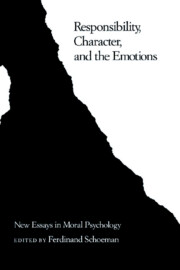Book contents
- Frontmatter
- Contents
- List of Contributors
- Acknowledgments
- 1 Introduction
- Part I Responsibility and Character
- Part II Responsibility and Culpability
- 8 The Moral Worth of Retribution
- 9 Nonmoral Guilt
- 10 Provocation and Culpability
- 11 Responsibility and the Limits of Evil: Variations on a Strawsonian Theme
- 12 Statistical Norms and Moral Attributions
- 13 Guilt, Punishment, and Desert
- 14 Intention, Foreseeability, and Responsibility
- Index of Names
11 - Responsibility and the Limits of Evil: Variations on a Strawsonian Theme
Published online by Cambridge University Press: 03 February 2010
- Frontmatter
- Contents
- List of Contributors
- Acknowledgments
- 1 Introduction
- Part I Responsibility and Character
- Part II Responsibility and Culpability
- 8 The Moral Worth of Retribution
- 9 Nonmoral Guilt
- 10 Provocation and Culpability
- 11 Responsibility and the Limits of Evil: Variations on a Strawsonian Theme
- 12 Statistical Norms and Moral Attributions
- 13 Guilt, Punishment, and Desert
- 14 Intention, Foreseeability, and Responsibility
- Index of Names
Summary
Responsibility is … one aspect of the identity of character and conduct. We are responsible for our conduct because that conduct is ourselves objectified in actions.
– John Dewey, “Outlines of a Critical Theory of Ethics”
There is nothing regrettable about finding oneself, in the last analysis, left with something which one cannot choose to accept or reject. What one is left with is probably just oneself, a core without which there could be no choice belonging to the person at all. Some unchosen restrictions on choice are among the conditions of its possibility.
– Thomas Nagel, The Possibility of Altruism
Our practices do not merely exploit our natures, they express them.
– Peter Strawson, “Freedom and Resentment”
Introduction
Regarding people as responsible agents is evidently not just a matter of belief. So regarding them means something in practice. It is shown in an embrace or a thank you, in an act of reprisal or obscene gesture, in a feeling of resentment or sense of obligation, in an apology or demand for an apology. To regard people as responsible agents is to be ready to treat them in certain ways.
In “Freedom and Resentment,” Peter Strawson is concerned to describe these forms of treatment and their presuppositions. As his title suggests, Strawon's focus is on such attitudes and responses as gratitude and resentment, indignation, approbation, guilt, shame, (some kinds of) pride, hurt feeling, (asking and giving) forgiveness, and (some kinds of) love. All traditional theories of moral responsibility acknowledge connections between these attitudes and holding one another responsible.
- Type
- Chapter
- Information
- Responsibility, Character, and the EmotionsNew Essays in Moral Psychology, pp. 256 - 286Publisher: Cambridge University PressPrint publication year: 1988
- 62
- Cited by

